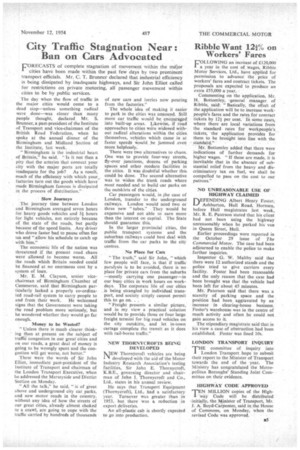City Traffic Stagnation Near : Ban on Cars Advocated
Page 39

If you've noticed an error in this article please click here to report it so we can fix it.
FORECASTS of complete stagnation of movement within the major cities have been made within the past few days by two prominent transport officials. Mr. C. T. Brunner declared that industrial efficiency is being dissipated by inadequate highways, and Sir John Elliot called for restrictions on private motoring, all passenger movement within cities to be by public services.
The day when the flow of traffic in the major cities would come to a dead stop—unless something radical were done—was closer than many people thought, declared Mr. S. Brunner, a past-president of the Institute of Transport and vice-chairman of the British Road Federation, when he spoke at the annual dinner of the Birmingham and Midland . Section of the Institute, last week,
"Birmingham is the industrial heart of Britain," he said. " Is it not then a pity that the arteries that connect your city with the major ports are totally inadequate for the job? As a result, much of the efficiency with which your_ factories turn out the goods which have made Birmingham famous is dissipated in the process of distribution."
Slow Journeys The journey time between London and Birmingham averaged seven hours for heavy goods vehicles and 51 hours for light vehicles, not entirely because of the state of the roads, but partly because of the speed limits. Any driver who drove faster had to pause often for tea and "allow his schedule to catch up with him."
The economic life of the nation was threatened if the present road chaos were allowed to become worse. All the roads which Britain needed could be financed at no enormous cost by a system of loan.
Mr. E. M. Clayson, senior vicechairman of Birmingham .Chamber of Commerce, said that Birmingham particularly lacked a properly co-ordinated road-rail system to carry people to and from their work. He welcomed signs that the Government were taking the road problem more seriously, but he wondered whether they would go far enough.
Money to be Wasted?
" Unless there is much clearer thinking than at present on the subject of trafficcongestion in our great cities and on our roads, a great deal of money is going to be wrongly spent and the congestion will get worse, not better."
These were the words of Sir John Elliot, immediate past-president of the Institute of Transport and chairman of the London Transport Executive, when he addressed the Merseyside and District Section on Monday.
" All the talk," he said, "is of great above and underground city car parks, and new motor roads in the country, without any idea of how the streets a our great cities, already almost choked to a crawl, are going to cope with. the traffic carried by hundreds of thousands
of new cars and lorries now pouring from the factories."
The whole idea of making it easier to park in the cities was unsound. Still more car traffic would be encquraged_ into built-up areas. Likewise, if road approaches to cities were widened without radical alterations within the cities.. themselves, vehicles which came in at faster speeds would be jammed even more helplessly.
There were two alternatives to chaos. One was to provide four-way streets, fly-over junctions, dozens of parking spaces and other modern facilities in the cities. It was doubtful whether this could be done. The second alternative was to widen the trunk roads where most needed and to build car parks on the outskirts of the citieS.
Car passengers would, in he case of London, transfer to the underground railways. London would need two or three new "tubes?' • They would be expensive and not able to earn more than the interest on capital. The State should guarantee this.
In the larger provincial cities, the public transport systems and the suburban railways could best deal with traffic from the car parks to the city centres.
No Place for Cars
" The truth," said Sir John, "which few people will face, is that if traffic paralysis is to be avoided, there is no place for private cars from the suburbs —mostly carrying one passenger—in our busy cities in work hours on workdays. The corporate life of our cities . is being strangled by individual transport, and society simply cannot permit this to go on. . .
"Freight presents a similar picture, and in my view a practical solution would be to provide three or four large freight termini for big road vehicles on the city outskirts, and let in-town cartage complete the transit as it does with rail-borne traffic."
NEW THORNYCROFTS BEING DEVELOPED NEW Thornycroft vehicles are being developed with the aid of the Motor Industry Research Association's testing facilities, Sir John E. Thornycroft, K.B.E., governing director and chairman of John I. Thornycroft and Co., Ltd., states in his annual review.
He says that Transport Equipment (Thorn ycroft), Ltd., had a satisfactory year. Turnover was greater than in 1953, but there was a reduction in export deliveries.
An all-plastic cab is shortly expected to go into production.




































































































